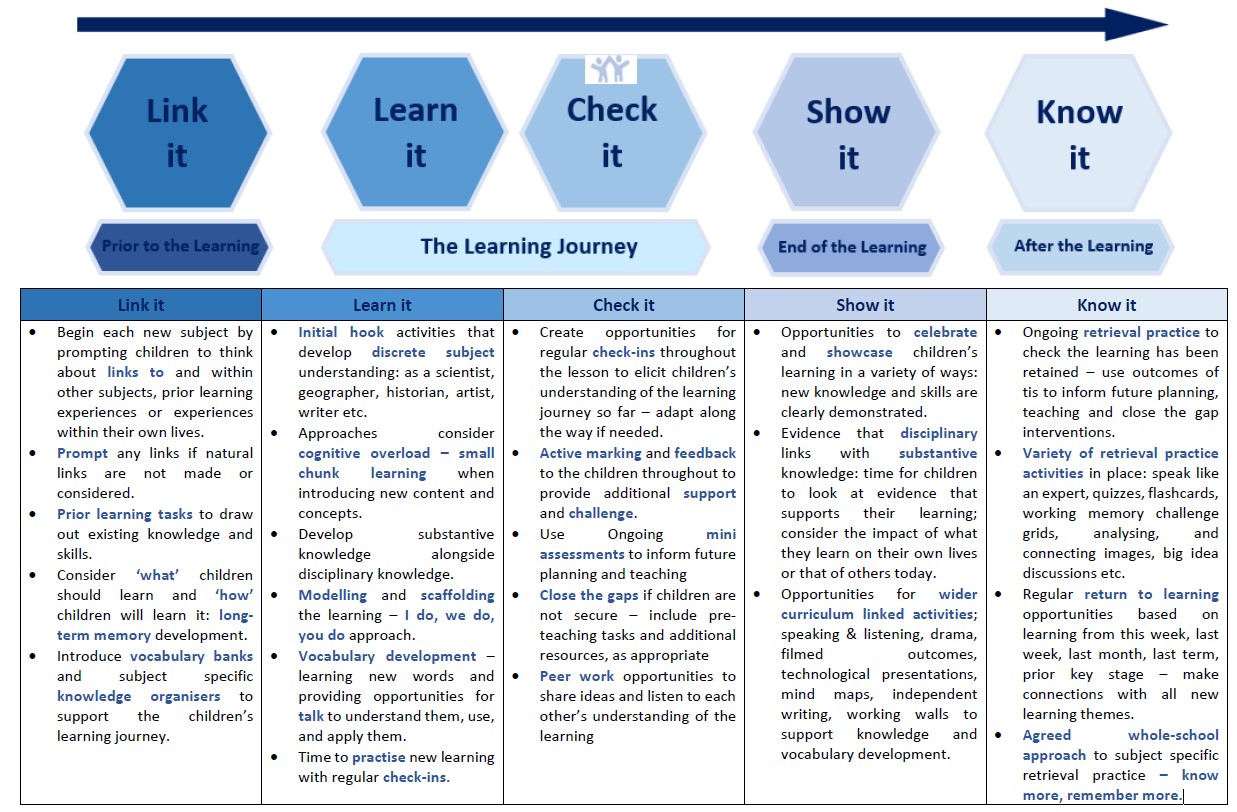Curriculum Implementation: Our How?
How we achieve our Curriculum Vision
Knowledge underpins and enables the application of skill. We strive for children to learn new skills alongside knowledge, ensuring that both are explicitly developed. Recognising that knowledge and skills are intertwined, we take a cross-curricular approach to maximise links across subjects and to ensure teaching and learning is relevant and meaningful.
Using the EYFS Statutory Framework and National Curriculum, age-appropriate progression in knowledge and skills for each core and foundation subject has been identified and mapped out across the primary phases. Priority is given to the development of English and Maths skills of all our pupils.
Our vibrant and rich curriculum is designed so that the subject specific skills are scaffolded within a cross-curricular theme or context each term. Themes are delivered on an annual basis in the Early Years and on a two-yearly rolling programme for KS1, Years 3 & 4 and Year 5 & 6. Topics are carefully designed to capture the interests and imaginations of our children, within a local context. To ensure that progression and balance is maintained, the programmes of study are developed into medium-term plans which clearly highlight the learning objectives, assessment opportunities, differentiated tasks as well as links to other subjects. Themes include European Explorers; Field to Fork; Rule Britannia; War & Peace; Fighting Fit; Earth Matters; Amazon Adventure; as well as many more exciting topics.
Each theme is introduced through a Curriculum Launch Day which aims to ignite children’s interest and motivation to learn; and finishes with a final celebration and showcase of the learning journey. We use every opportunity to capitalise on connections between subjects and develop and apply all important reading, writing, speaking and listening, and maths skills in a purposeful context.
We teach discreet subjects with an aim of preserving the unique nature of each subject and allowing children to gain a better understanding of each subject discipline, making connections where they are appropriate. We give a great deal of thought to the difference between substantive and disciplinary knowledge. We understand that there is more to a subject than the information, facts and concepts that are taught and learned. These things are substantive knowledge. Disciplinary knowledge focuses on what it is that historians, geographers, scientists, language speakers or programmers do to preserve the discipline in each subject and make it about more than substantive knowledge. This ensures that our children are supported not just to ‘know and remember’ but also ‘to do.’
RE, PE, PSHE which includes RSE and Health education are often taught as discreet subjects to ensure coverage of the main objectives and age-appropriate knowledge and skill development across the school.
The Overview of Research document provided in the 2019 Ofsted framework states that "learning is at least partly defined as a change in pupils’ long-term memory." The guidance also states that retrieval practice is an effective teaching tool for strong retention of knowledge. Our curriculum supports schema development (a pattern of repeated actions, which will later develop into learnt concepts). We have established key concepts in each subject area and have carefully considered how they interconnect with other subjects. These are broken down into smaller component parts: the knowledge and skills objectives that provide the building blocks for learning – ‘know more, remember more’. These are carefully sequenced, revisited, and built upon through our curriculum from EYFS to Year 6.









